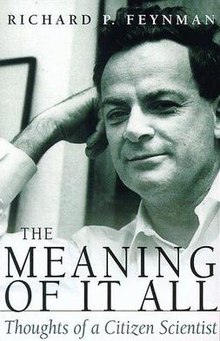
‘The Meaning Of It All’ is one of my favourite books written by the hero-physicist Richard P. Feynman.
This book is a collection of three conferences Feynman held in 1963 at the University of Washington. He’s famous for the intellectual provocation he used to throw at the audience and for his clear way of speaking. In these talks, he explains the scientific method, showing the uncertainty of science and of its discoveries. For example, it is often the case that an almost certainly false hypothesis can become an almost certainly true hypothesis and vice versa.
What I really enjoyed about this book was Feynman’s apparent ingenuity and his ceaseless curiosity and enthusiasm. He covers a lot of topics apart from physics itself: from ethics to religion to politics. All of his reasonings concur into one big question: what’s the meaning of it all? Reading Feynman’s talk is out of this world: he’s able to catch anyone’s attention with his simple yet so effective style. In fact, reading this book took just a few days.
To sum up, I recommend this book to literally everyone, as Feynman somehow is able to make very difficult topics feasible to a very diverse audience.